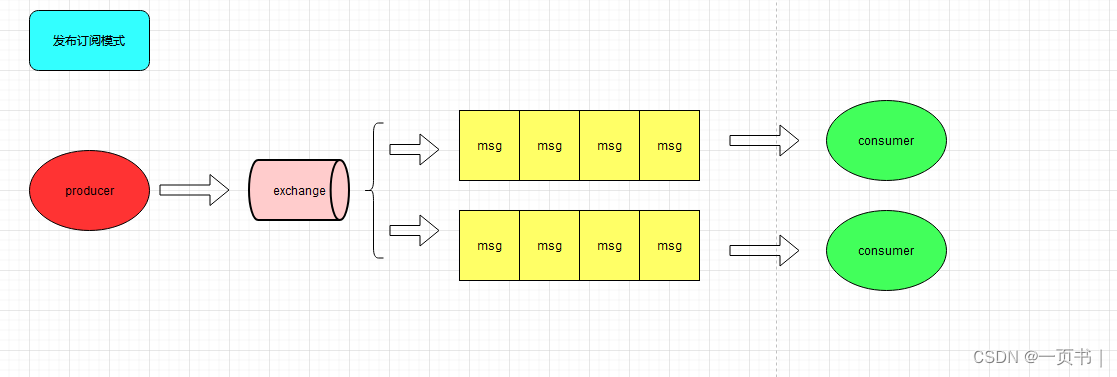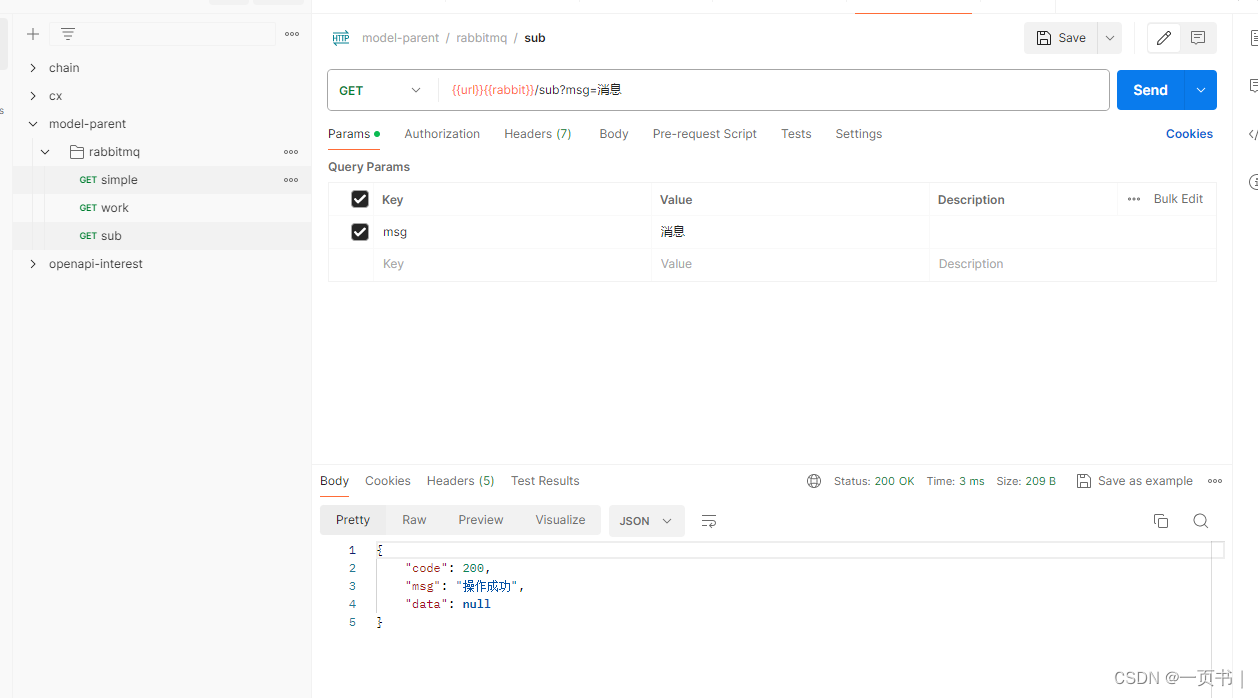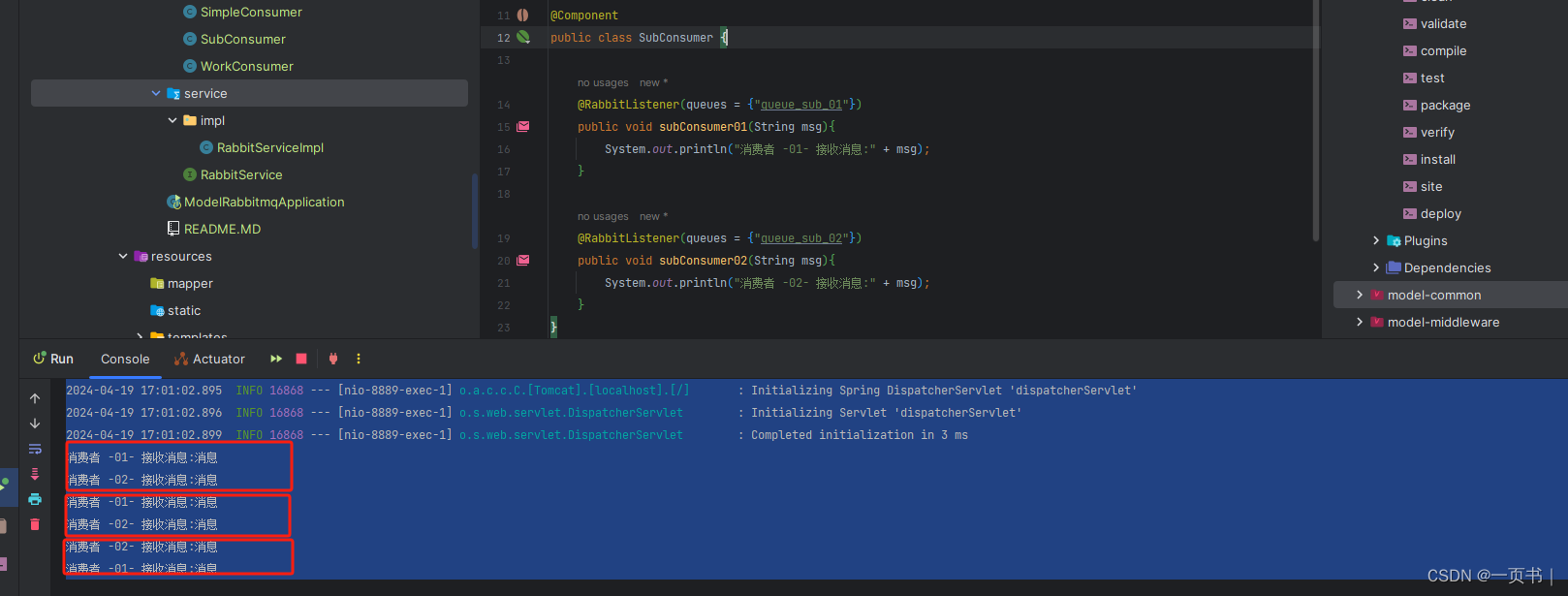概念
发布/订阅模式(Publish/Subscribe)是 RabbitMQ 中常见的一种消息传递模式,用于将消息广播给多个消费者。在这种模式中,消息发送者(发布者)将消息发送到一个交换机(exchange),交换机将消息广播到所有与之绑定的队列,然后消费者(订阅者)可以从这些队列中接收消息。
工作流程
- 生产者发送消息: 生产者将消息发送到一个交换机,而不是直接发送到队列。
- 交换机将消息广播: 交换机接收到消息后,根据预定义的规则将消息广播到所有与之绑定的队列。这个过程称为消息路由。
- 多个消费者监听队列: 多个消费者可以分别监听不同的队列,或者监听同一个队列。
- 消息处理: 每个消费者接收到广播的消息后,进行相应的处理。每个消息只会被消费一次,但是可以被多个消费者同时处理。

特点
- 消息广播:消息被广播到所有与交换机绑定的队列,而不是直接发送到特定的队列。
- 解耦合:发布者和订阅者之间通过交换机进行解耦,发布者无需知道消息将被传递到哪些队列。
- 多播:支持多个消费者同时处理同一条消息,以实现消息的多播效果。
- 灵活性:可以根据需要使用不同类型的交换机和绑定规则,以满足不同的消息传递需求。
发布/订阅模式适用于需要将消息广播给多个消费者的场景,例如实时通知、日志记录、事件处理等。
Springboot集成
这里为了方便和速度就不配置yml文件中,直接编辑,这里配置两个队列
交换机名称: exchange_sub
队列一名称: queue_sub_01
队列一名称: queue_sub_02
1.创建队列和交换机并绑定
在SubConfig文件中配置
这里方便区分,新建了文件SubConfig,每个工作模式创建队列和交换机的过程区分开,全都配置到RabbitmqConfig文件中也是可以的,同时也可以通过RabbitAdmin进行绑定(另一种方式)。
package com.model.config;
import org.springframework.amqp.core.*;
import org.springframework.context.annotation.Bean;
import org.springframework.context.annotation.Configuration;
/**
* @Author: Haiven
* @Time: 2024/4/19 16:29
* @Description: TODO
*/
@Configuration
public class SubConfig {
/**
* 发布/订阅模式的交换机
* @return exchange
*/
@Bean(name = "subExchange")
public Exchange getSubExchange(){
return ExchangeBuilder
.fanoutExchange("exchange_sub")
.durable(true)
.build();
}
/**
* 发布/订阅模式的队列 1
* @return 队列 1
*/
@Bean(name = "subQueue01")
public Queue getSubQueue01(){
return QueueBuilder
.durable("queue_sub_01")
.build();
}
/**
* 发布/订阅模式的队列 2
* @return 队列 2
*/
@Bean(name = "subQueue02")
public Queue getSubQueue02(){
return QueueBuilder
.durable("queue_sub_02")
.build();
}
/**
* 绑定队列01
* @return binding
*/
@Bean
public Binding getSubBinding01(){
return BindingBuilder
.bind(getSubQueue01())
.to(getSubExchange())
// 通配符模式 要匹配的路由键 此处为发布/订阅模式 填""就可以
.with("")
.noargs();
}
/**
* 绑定队列02
* @return binding
*/
@Bean
public Binding getSubBinding02(){
return BindingBuilder
.bind(getSubQueue02())
.to(getSubExchange())
// 通配符模式 要匹配的路由键 此处为发布/订阅模式 填""就可以
.with("")
.noargs();
}
}
2.创建消费者
SubConsumer
package com.model.listener;
import org.springframework.amqp.rabbit.annotation.RabbitListener;
import org.springframework.stereotype.Component;
/**
* @Author: Haiven
* @Time: 2024/4/19 16:44
* @Description: TODO
*/
@Component
public class SubConsumer {
@RabbitListener(queues = {"queue_sub_01"})
public void subConsumer01(String msg){
System.out.println("消费者 -01- 接收消息:" + msg);
}
@RabbitListener(queues = {"queue_sub_02"})
public void subConsumer02(String msg){
System.out.println("消费者 -02- 接收消息:" + msg);
}
}
3.创建生产者并发送消息
package com.model.controller;
import com.code.domain.Response;
import com.model.service.RabbitService;
import org.springframework.amqp.rabbit.core.RabbitTemplate;
import org.springframework.web.bind.annotation.GetMapping;
import org.springframework.web.bind.annotation.RequestMapping;
import org.springframework.web.bind.annotation.RestController;
import javax.annotation.Resource;
/**
* @Author: Haiven
* @Time: 2024/4/19 9:46
* @Description: TODO
*/
@RestController
@RequestMapping("/producer")
public class ProducerController {
@Resource
private RabbitService rabbitService;
@GetMapping("/simple")
public Response<Void> simple(String msg){
boolean res = rabbitService.simple(msg);
return res ? Response.success() : Response.fail();
}
@GetMapping("/work")
public Response<Void> work(String msg){
boolean res = rabbitService.work(msg);
return res ? Response.success() : Response.fail();
}
@GetMapping("/sub")
public Response<Void> sub(String msg){
boolean res = rabbitService.sub(msg);
return res ? Response.success() : Response.fail();
}
}
package com.model.service.impl;
import com.model.service.RabbitService;
import lombok.extern.slf4j.Slf4j;
import org.springframework.amqp.rabbit.core.RabbitTemplate;
import org.springframework.beans.factory.annotation.Value;
import org.springframework.stereotype.Service;
import javax.annotation.Resource;
/**
* @Author: Haiven
* @Time: 2024/4/19 10:51
* @Description: TODO
*/
@Service
@Slf4j
public class RabbitServiceImpl implements RabbitService {
@Resource
private RabbitTemplate rabbitTemplate;
@Value("${rabbitmq.simple.queue}")
private String simpleQueue;
@Value("${rabbitmq.work.queue}")
private String workQueue;
@Override
public boolean simple(String msg) {
try {
rabbitTemplate.convertAndSend(simpleQueue, msg);
return true;
}catch (Exception e){
e.printStackTrace();
return false;
}
}
@Override
public boolean work(String msg) {
try {
rabbitTemplate.convertAndSend(workQueue, msg);
return true;
}catch (Exception e){
e.printStackTrace();
return false;
}
}
@Override
public boolean sub(String msg) {
try {
//路由模式就不能直接发送消息到队列了, 而是发送到交换机,由交换机进行广播, routingKey为路由Key 订阅模式给""
rabbitTemplate.convertAndSend("exchange_sub","", msg);
return true;
}catch (Exception e){
e.printStackTrace();
return false;
}
}
}
4.发送消息

发送成功

可以发现,发布/订阅模式下,推送到交换机的消息,会被所有绑定了交换机的队列接收
版权归原作者 一页书| 所有, 如有侵权,请联系我们删除。